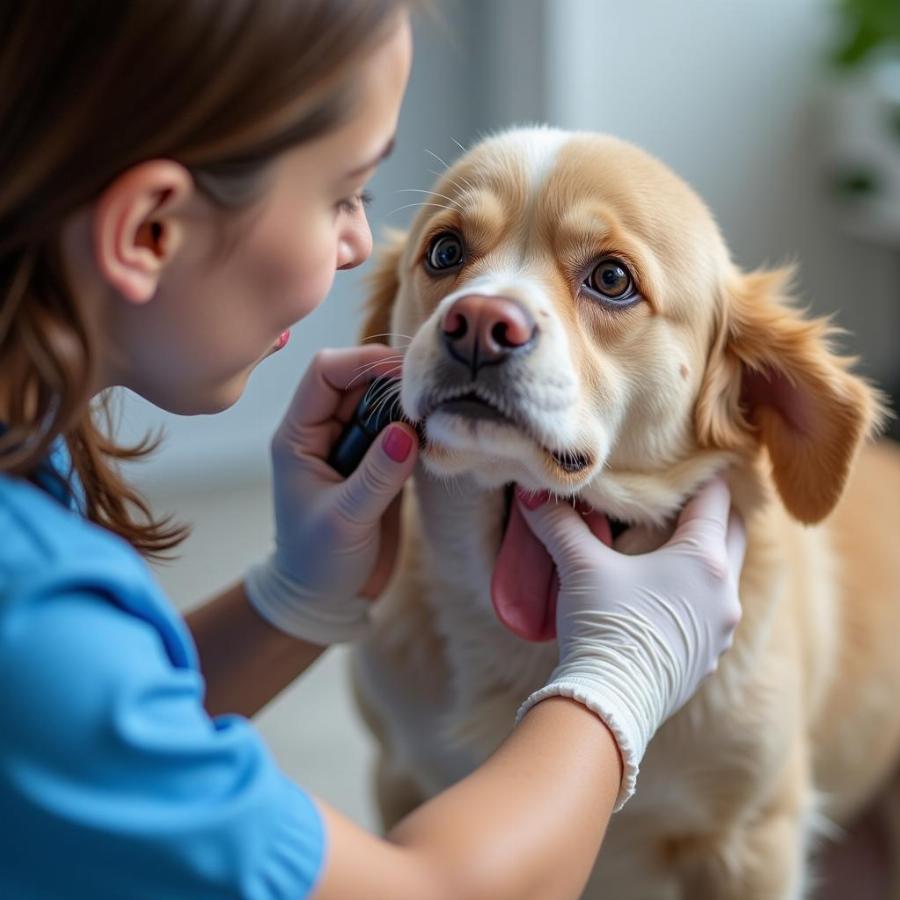An older dog doesn’t have periods in the same way a young female dog does. If your senior dog is experiencing vaginal bleeding, it’s crucial to understand that this isn’t a normal “period” and warrants immediate veterinary attention. This bleeding can indicate several health concerns, some of which can be serious. Let’s delve deeper into the possible reasons behind vaginal bleeding in older female dogs and what you should do.
Is Vaginal Bleeding Normal in Older Dogs?
No, vaginal bleeding in senior female dogs is not considered normal. While younger, unspayed females experience estrus (or “heat”) cycles, characterized by bleeding, this should cease after spaying. In older dogs, vaginal discharge or bleeding can be a sign of a range of health issues, from relatively minor infections to more serious conditions. Ignoring these signs can be detrimental to your dog’s health, so prompt veterinary care is essential.
Common Causes of Bleeding in Senior Female Dogs
Several factors can contribute to vaginal bleeding in older dogs. These include:
- Uterine Infections (Pyometra): This is a serious infection of the uterus and a common cause of vaginal discharge, often bloody or pus-filled, in older unspayed females. Pyometra is a life-threatening condition requiring urgent veterinary intervention.
- Uterine Tumors: Both benign and malignant tumors can develop in the uterus of older dogs, potentially causing bleeding.
- Vaginal Tumors: Similar to uterine tumors, tumors in the vagina can also lead to bleeding.
- Vaginitis: Inflammation or infection of the vagina can cause bleeding or discharge.
- Urinary Tract Infections (UTIs): While UTIs primarily affect the urinary system, they can sometimes cause blood to appear in the urine, which may be mistaken for vaginal bleeding.
- Trauma: Injury to the genital area can result in bleeding.
- Bleeding Disorders: While less common, certain bleeding disorders can contribute to vaginal bleeding.
What Should I Do if My Old Dog is Bleeding?
If you notice any vaginal bleeding in your senior dog, contact your veterinarian immediately. Early diagnosis and treatment are critical, especially for conditions like pyometra, which can be fatal if left untreated. Describe the bleeding in detail to your veterinarian, including the color, amount, and any other accompanying symptoms.
How is Vaginal Bleeding Diagnosed and Treated?
Your veterinarian will likely perform a physical examination and may recommend further diagnostic tests such as blood work, urinalysis, ultrasound, and possibly a biopsy. Treatment will depend on the underlying cause of the bleeding. For infections like pyometra, aggressive treatment with antibiotics and potentially surgery (spay) is necessary. Tumors may require surgery, chemotherapy, or radiation therapy. Vaginitis and UTIs are typically treated with medication.
 Veterinarian Examining a Dog's Genital Area
Veterinarian Examining a Dog's Genital Area
What Can I Do to Prevent Vaginal Bleeding in My Senior Dog?
The most effective way to prevent many causes of vaginal bleeding is to spay your female dog before she reaches maturity. Spaying eliminates the risk of pyometra and significantly reduces the risk of uterine and ovarian cancers. Regular veterinary checkups are also crucial for early detection of any potential health problems.
Can an Old Dog Still Go Into Heat?
While extremely rare, it is possible for a very old unspayed female dog to experience estrus. However, any bleeding in a senior dog should be investigated by a veterinarian to rule out more serious health issues.
Conclusion
Vaginal bleeding in an older dog is a serious sign that should never be ignored. While it can be alarming, prompt veterinary care can significantly improve your dog’s prognosis. Regular checkups and spaying are crucial preventative measures for protecting your dog’s long-term health. Remember, early intervention is key to ensuring a happy and healthy life for your senior companion.
FAQs
- Q: Can a spayed dog still bleed from her vagina? A: While rare, it’s possible. Bleeding after spaying can sometimes occur due to surgical complications. However, any bleeding should be reported to your veterinarian.
- Q: What are the signs of pyometra in dogs? A: Signs can include vaginal discharge (often bloody or pus-filled), lethargy, increased thirst and urination, vomiting, and abdominal swelling.
- Q: How often should my senior dog see the vet? A: Generally, senior dogs should have checkups at least twice a year.
Related Articles on Beaut Dogs
You may also find these articles helpful: fresh dental for dogs and are dogs mouths cleaner than a human's.